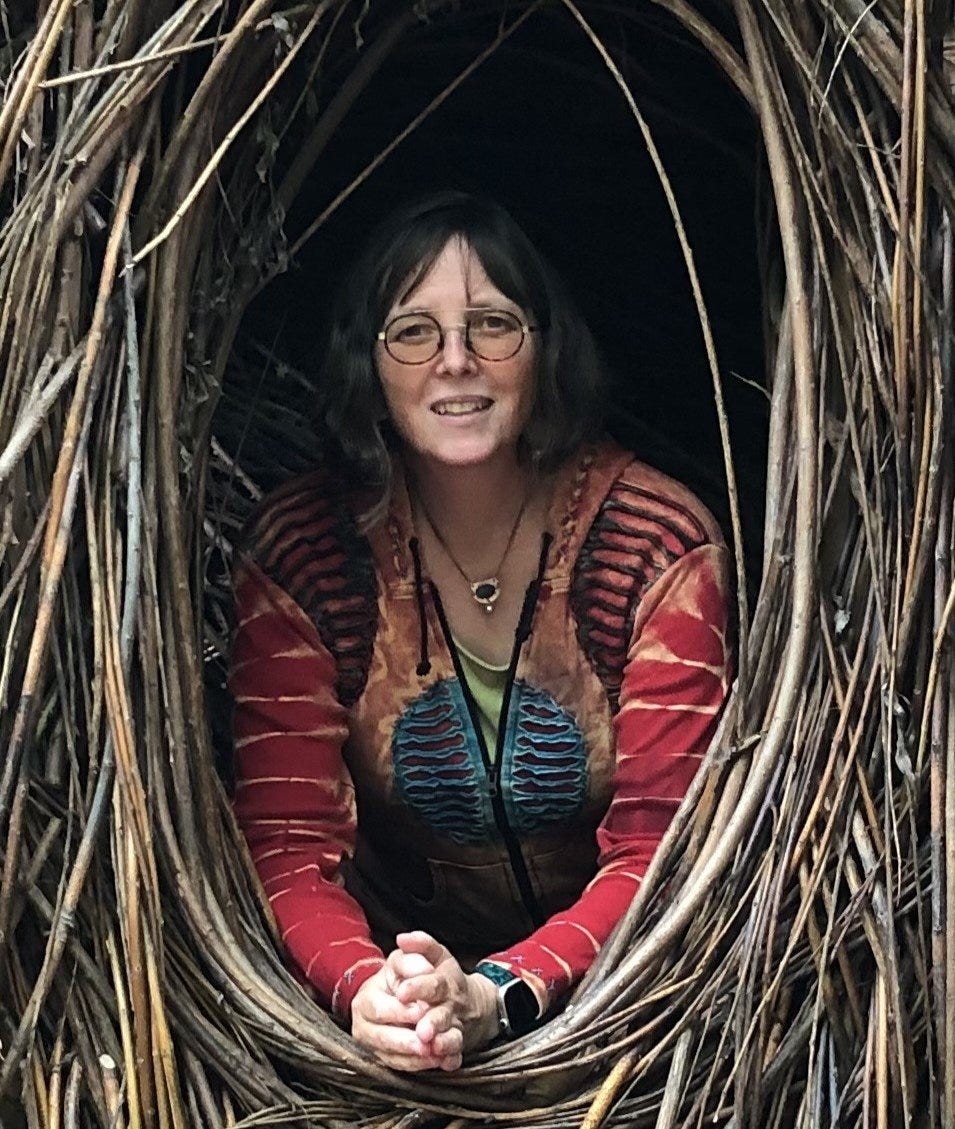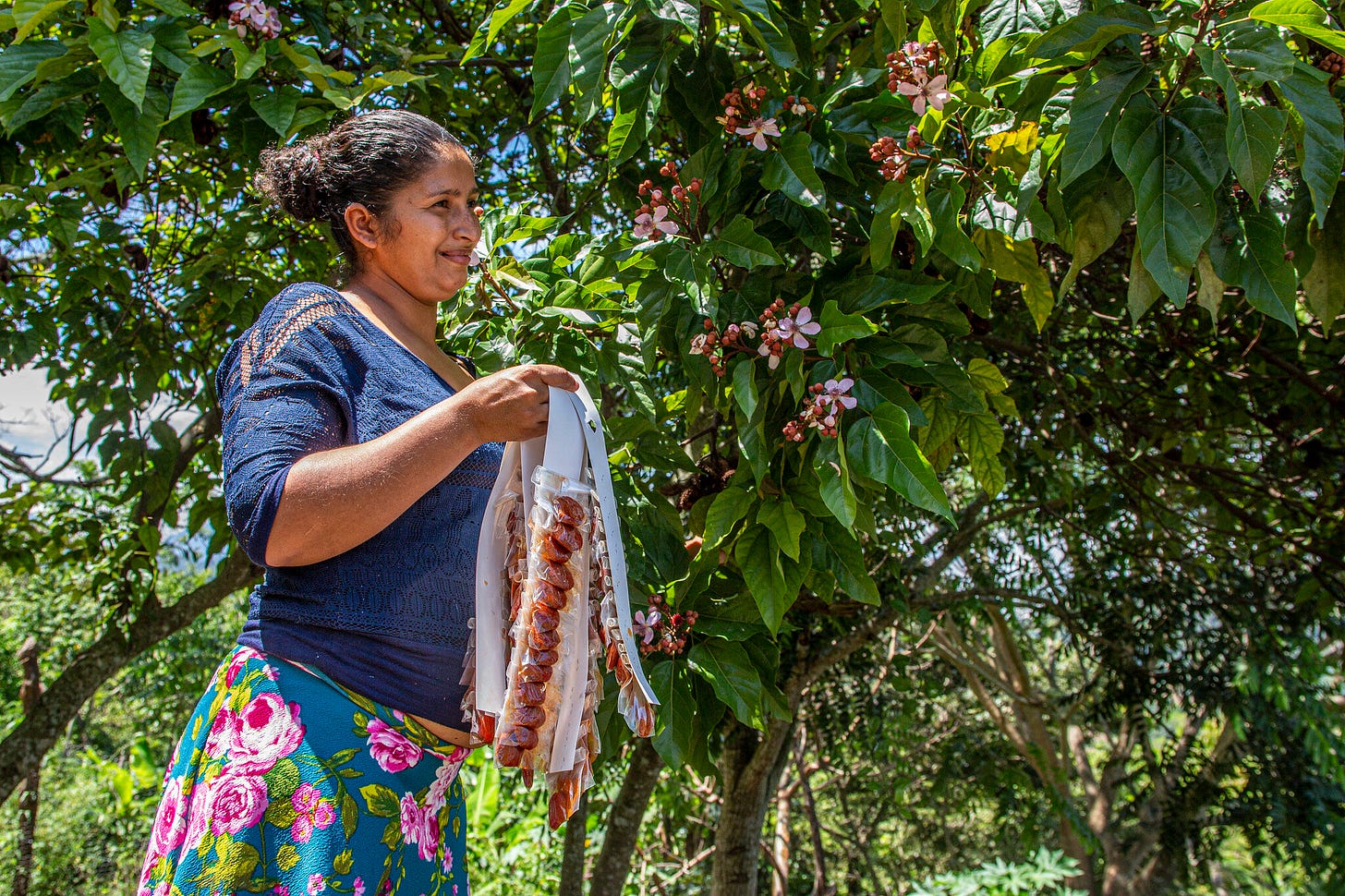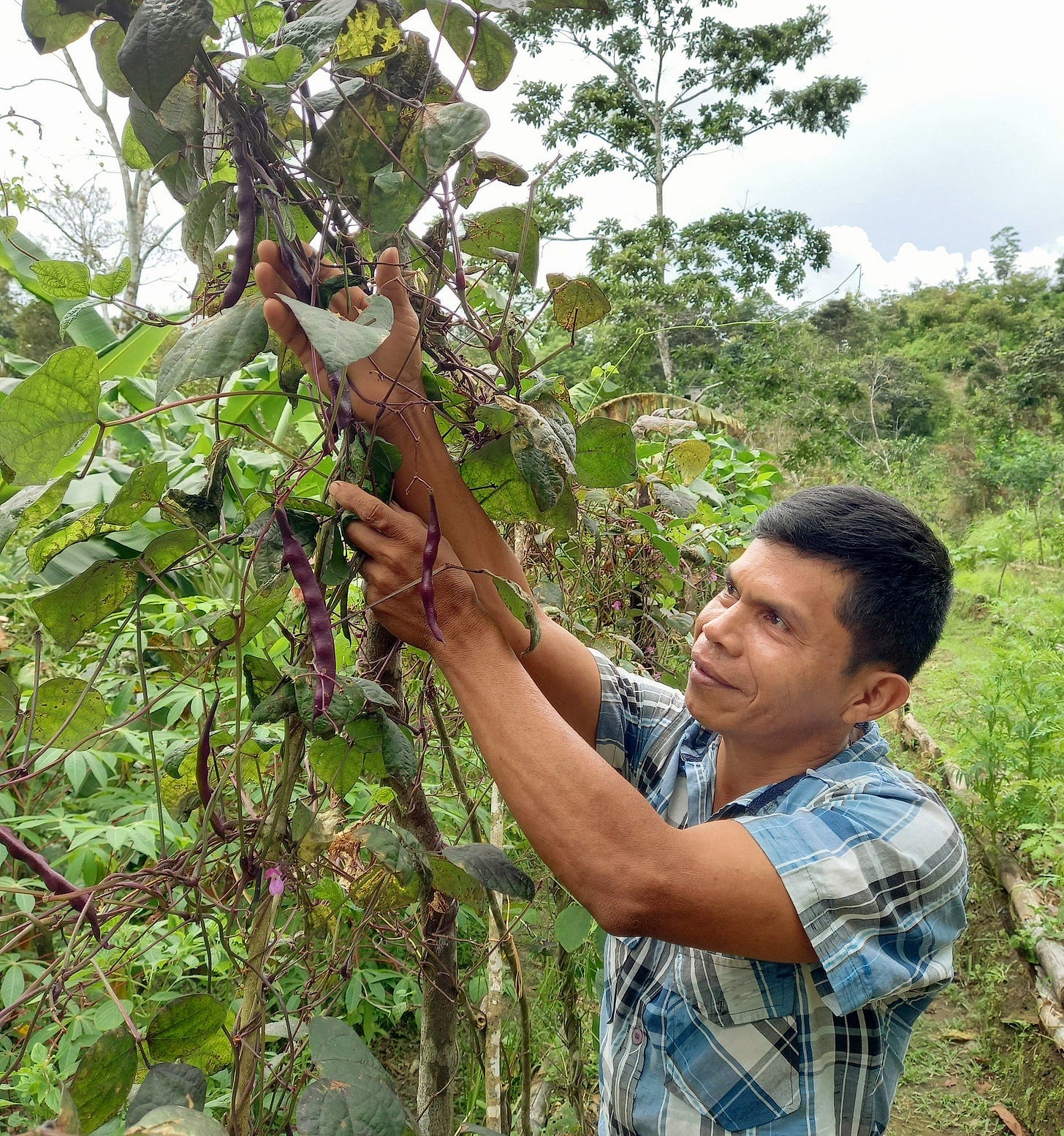She Plants Stories So Others Can Plant Trees: Florence Reed and the Power of “We”
‘Roots of Renewal’ Film Shares the How Small-Scale Farms Are Reshaping the Planet's Future

The Bar Harbor Story is generously sponsored by Thrive Juice Bar & Kitchen.
BAR HARBOR—When Florence Reed was a little girl climbing trees in New Hampshire, breathing in the forest air, spying on the adults nearby and dreaming of things, she may not have explicitly realized that she’d spend much of her life making a huge difference.
But she did.
Reed is known for her work getting people the funds, money, and courage to plant trees, but that’s not the only thing the Surry woman who founded Sustainable Harvest in 1997 plants.
“A big part of my job is planting the stories. The farmers are planting the trees, and I'm planting the stories so they can plant the trees,” Reed said.
So far Reed has planted thousands of stories related to making lives and the environment better, one human being at a time.
“Sustainable Harvest,” its website says, “was built on the idea that environmental devastation and rural poverty are unavoidably linked.”
And because they are? The solutions need to be connected as well, Reed said.
“Food security, human dignity, and environmental sustainability shouldn't be seen as a privilege or something extra. They should be seen as the basis from which we build our society,” she said.
She started doing the work in 1991, and she hasn’t stopped. Since then, Sustainable Harvest International has worked with 4,000 family farmers to restore more than 30,000 acres and plant over 5 million trees.
According to recent statistics, only a small fraction of agricultural funds, a mere 2%, are allocated to support smallholder farmers, despite their essential contribution to feeding the world's population. The food industry is also a significant contributor to greenhouse gas emissions, accounting for 25% of total emissions annually.
“I think in the beginning I was just so flying by the seat of my pants with so little to, um, to go on that I, you know, just hoping to make it to the next week, and I've always also been a kind of a dreamer, and so I, I don't remember if it was from the very beginning or soon thereafter that I was also thinking that I want to keep pushing this to have a global impact and I’m still kind of trying to get there,” Reed said.
And while her efforts and the organization’s efforts—5 million trees, 4,000 families, 30,000 acres—may seem colossal to most of us, it’s still not quite enough for Reed. There is always more good work to do when it comes to food and the environment and people.
“In some ways, I'm disappointed that we haven't done more. But then sometimes I am really thrilled when like I'll go to a graduation ceremony and see 50 farmers graduate and see some of their farms and see how it's totally transformed things for them and for the land. And yeah, then it's really nice to think, hey, wow, I got this ball rolling.”
There will be panel and screening for the newest Sustainable Harvest International documentary at the College of the Atlantic in July. In the film, “Roots of Renewal,” author and environmentalist Bill McKibben says, “The most progressive and interesting farmers on this planet are often found far off at the end of dirt roads in parts of Asia or Africa or Central America or South America figuring out how you can provide in abundance with low inputs and some real positive effect on the world around you that's the miracle of farming.”
HOW IT BEGAN

Reed always had an affinity for the outdoors.
“My parents, I think, helped me really connect to nature from a young age and to travel and sort of create an interest in different cultures and different people,” she said. “I feel like I was born to the correct parents to put me on this path and had the correct experiences in my childhood and youth to put me on this path. And everything's fallen into place. And when roadblocks came up, something happened that will always get us through.”
When you talk to Reed, you’ll notice something if you listen. Almost every time she begins speaking, even when you ask her a question about herself, in her answers, the “I” in her sentence becomes a “we.” Even when it’s about Reed, she starts to include others in her actions and in her answers.
When she was young, Reed’s father had a cousin who lived in Dover, New Hampshire, and she had a camp in Lee, Hampshire.
“So we would go to New Hampshire twice a year to visit her. And when we did, we would usually go once to have lunch at the New England Center, which was the restaurant on the UNH campus,” she said. “They had the tall windows and the trees, and so it was like being in the forest.”
It made an impact.
“I just always felt this strong connection to forest, and so I think that experience was like ‘okay, I'm going to the University of New Hampshire,’” she said and she did.
After UNH, she headed to the Peace Corps and served as an agroforestry volunteer in Panama. While there, she saw forests burn for farmland by farmers as they tried to feed their families.
But the land could only sustain crops for a short time. More forest would be burnt, more land cleared.
“Reed knew that the farmers recognized the catastrophic impacts of slash-and-burn agriculture, but they didn’t see any other way to provide for their families,” the website says.
The key would be to train the farmers in sustainable practices and make a multi-year program to help them learn those practices, try them out, make them work for them.
So, that’s what she did. Sustainable Harvest was born.
Working from a bedroom in her parent’s home, she found funding, she grew a team, she began telling the stories of change, and she planted those stories in the hearts of donors, scientists, and farmers. The “I” of her story became a “we” that grew larger and larger and more encompassing.
THE PATH AND THE PARTNERS
”Yeah, I feel very lucky. I feel like I've been sort of on this path for what my life is supposed to be about since I was a child,” Reed said. “And it's just always, I mean, you know, obviously there have been ups and downs and moments of doubt and so on, like anyone. But overall, I feel like it's always been very clear to me what my purpose in life is. So I feel lucky.”
Reed is also the first to say that though she started Sustainable Harvest International, it’s not about her. It’s about the we. It’s about the staff, too, and donors. But mostly? It’s about the farmers.
The work is about people like Demetrio Martinez Jr. of Panama.
Every year when he was a child, Martinez’s family burnt the forest so that they could grow crops. Every year, his family didn’t grow enough to feed themselves. Every year, they didn’t grow enough to make money to sustain them.
“Demetrio later worked on a conventional rice plantation far from home, with meager pay, and the heavy use of chemicals made him sick. Now, he works on his own farm, has a diversified income, and a health survey affirmed that his family’s health is better than that of other families in the area,” according to SHI’s website.
Now, a new short documentary, Roots of Renewal, will highlight the work and the “critical role of smallholder farmers in addressing the growing climate crisis and their impact on global food systems,” according to a recent press release.
The movie focuses on those farmers as one after another they tell their story of how the soil is the solution. Like Reed, her work, and Sustainable Harvest’s work, the movie is poignant and purposeful. It plants the stories that will hopefully convince people to join in and support the organization that works so hard with the farmers it partners with to restore the environment through “environmental education, agroforestry systems, diversified farm plots, and reforested areas.”
Reed hopes people will come to the event and gather and eat and participate. There is always more room in the “we.”
MORE ABOUT THE EVENT
The new short documentary Roots of Renewal will be screened on Tuesday, July 8, 2025 at 5:30 p.m. at Gates Auditorium, College Of the Atlantic.
The film will be introduced by Reed, who it features, and David Shaw, who also appears in the film and is the executive producer. Both are host committee members along with Michael Boland, Maryanne Mattson, Sydney Rockefeller, and Martha Stewart. Following the 30-minute film, there will be a discussion facilitated by Janeen Simon who is the executive director of Sustainable Harvest International, the organization highlighted in the film. Light refreshments will be served and donations accepted throughout the event.
There will be a fair amount of socializing time at the event; they will the show film; the executive director will be there, and there will be a question and answer after the screening.
Roots of Renewal captures the essence of resilience and hope in the face of agricultural challenges, showcasing the untold stories of smallholder farmers around the world and shedding a light on how sustainable agriculture practices are at the cutting edge of innovation in the agricultural industry as they aim to address environmental, social, and economic challenges while ensuring long-term food security.

By prioritizing methods that have positive rather than negative impacts on the environment, conserve natural resources, and promote biodiversity, sustainable agriculture fosters resilience in the face of climate change and diminishing resources. It also could sequester billions of tons of greenhouse gasses globally.
The film features insightful interviews with leading experts in the field, including:
Bill McKibben, Environmentalist, journalist and author
Eric Toensmeier, Author, lecturer and senior biosequestration fellow at project Drawdown
Vandana Shiva, scholar, food sovereignty activist, and Right Livelihood Award recipient
Film partners include Myriad, Waterbear and David E. Shaw.
About Sustainable Harvest International

Founded in 1997 by Florence Reed, Sustainable Harvest International (SHI) emerged from Reed's firsthand experiences as a Peace Corps volunteer in Panama witnessing the environmental devastation caused by slash-and-burn agriculture.
Committed to providing sustainable solutions, Reed saw the potential for training farmers in more environmentally friendly practices. Starting in Honduras and expanding to Panama, Belize, and Nicaragua, SHI has worked with 4,000 families, planted 5 million trees, and continues to empower rural communities in Central America. Through grassroots efforts and collaboration with diverse stakeholders, SHI focuses on long-term impact, promoting sustainable agriculture, and fostering economic and environmental resilience in the global south.
LINKS TO LEARN MORE
You can learn more about Sustainable Harvest and how to help here.
To donate to the Roots of Renewal campaign.
To learn more about the film.
To attend/register for the July 8 event.
Follow us on Facebook. And as a reminder, you can easily view all our past stories and press releases here.
Update: The first caption in this story said STI rather than SHI. Apologies for the typo!
If you’d like to donate to help support us, you can, but no pressure! Just click here (about how you can give) or here (a direct link), which is the same as the button below.
If you’d like to sponsor the Bar Harbor Story, you can! Learn more here.








